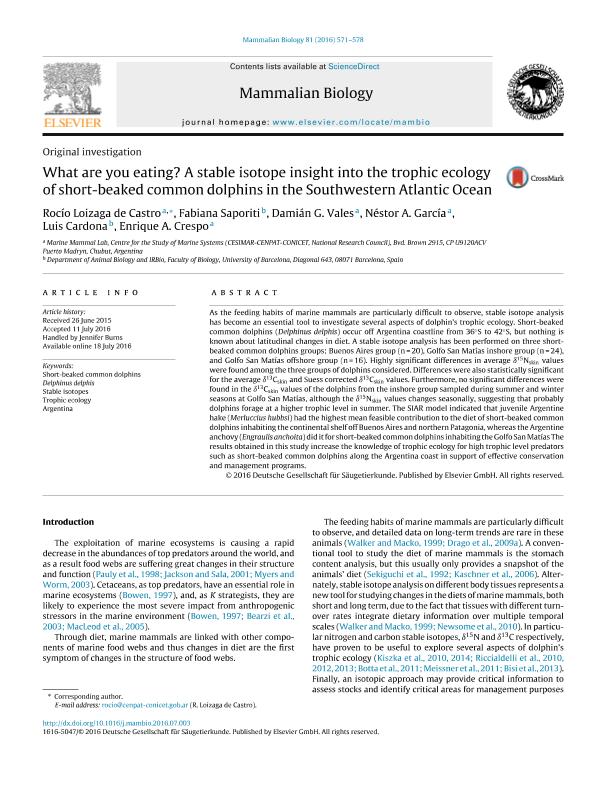Artículo
What are you eating? A stable isotope insight into the trophic ecology of short-beaked common dolphins in the Southwestern Atlantic Ocean
Loizaga de Castro, Rocio ; Saporiti, María Fabiana Sonia; Vales, Damián Gustavo
; Saporiti, María Fabiana Sonia; Vales, Damián Gustavo ; Garcia, Nestor Anibal
; Garcia, Nestor Anibal ; Cardona, Luis; Crespo, Enrique Alberto
; Cardona, Luis; Crespo, Enrique Alberto
 ; Saporiti, María Fabiana Sonia; Vales, Damián Gustavo
; Saporiti, María Fabiana Sonia; Vales, Damián Gustavo ; Garcia, Nestor Anibal
; Garcia, Nestor Anibal ; Cardona, Luis; Crespo, Enrique Alberto
; Cardona, Luis; Crespo, Enrique Alberto
Fecha de publicación:
11/2016
Editorial:
Elsevier Gmbh
Revista:
Mammalian Biology
ISSN:
1616-5047
Idioma:
Inglés
Tipo de recurso:
Artículo publicado
Clasificación temática:
Resumen
As the feeding habits of marine mammals are particularly difficult to observe, stable isotope analysis has become an essential tool to investigate several aspects of dolphin's trophic ecology. Short-beaked common dolphins (Delphinus delphis) occur off Argentina coastline from 36°S to 42°S, but nothing is known about latitudinal changes in diet. A stable isotope analysis has been performed on three short-beaked common dolphins groups: Buenos Aires group (n = 20), Golfo San Matías inshore group (n = 24), and Golfo San Matías offshore group (n = 16). Highly significant differences in average δ15Nskin values were found among the three groups of dolphins considered. Differences were also statistically significant for the average δ13Cskin and Suess corrected δ13Cskin values. Furthermore, no significant differences were found in the δ13Cskin values of the dolphins from the inshore group sampled during summer and winter seasons at Golfo San Matías, although the δ15Nskin values changes seasonally, suggesting that probably dolphins forage at a higher trophic level in summer. The SIAR model indicated that juvenile Argentine hake (Merluccius hubbsi) had the highest mean feasible contribution to the diet of short-beaked common dolphins inhabiting the continental shelf off Buenos Aires and northern Patagonia, whereas the Argentine anchovy (Engraulis anchoita) did it for short-beaked common dolphins inhabiting the Golfo San Matías The results obtained in this study increase the knowledge of trophic ecology for high trophic level predators such as short-beaked common dolphins along the Argentina coast in support of effective conservation and management programs.
Archivos asociados
Licencia
Identificadores
Colecciones
Articulos(CESIMAR)
Articulos de CENTRO PARA EL ESTUDIO DE SISTEMAS MARINOS
Articulos de CENTRO PARA EL ESTUDIO DE SISTEMAS MARINOS
Citación
Loizaga de Castro, Rocio; Saporiti, María Fabiana Sonia; Vales, Damián Gustavo; Garcia, Nestor Anibal; Cardona, Luis; et al.; What are you eating? A stable isotope insight into the trophic ecology of short-beaked common dolphins in the Southwestern Atlantic Ocean; Elsevier Gmbh; Mammalian Biology; 81; 6; 11-2016; 571-578
Compartir
Altmétricas



